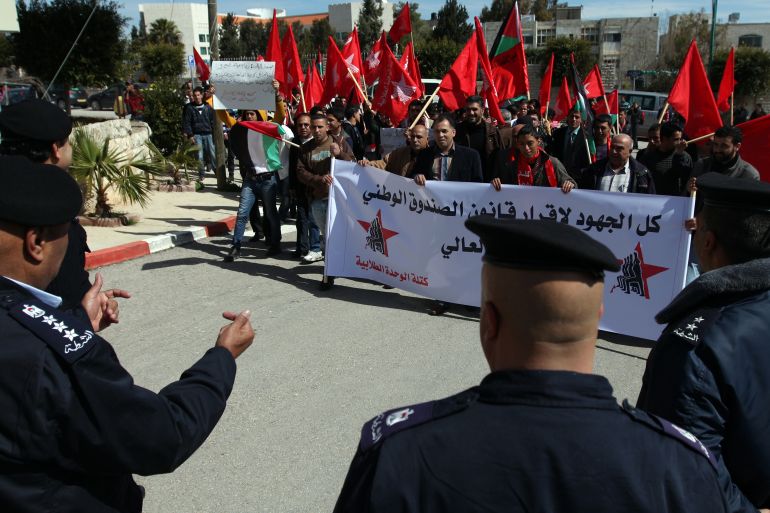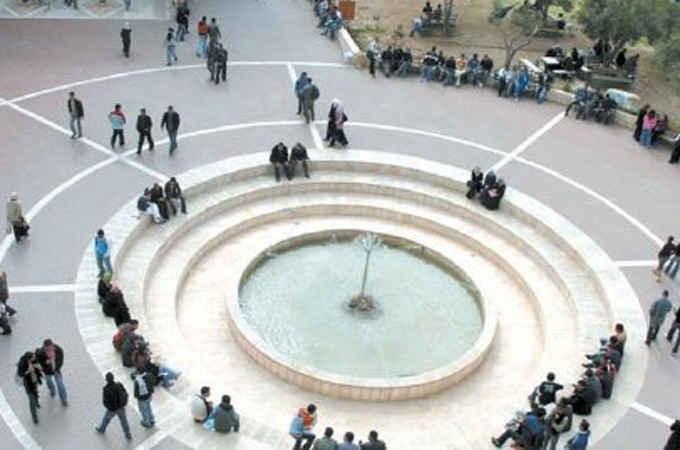Cash crunch cripples Palestinian colleges
Massive budget deficits have forced education institutions to cut staff and programmes.

Ramallah, Occupied West Bank – Until recently Palestinian colleges were among the best in the Arab world, but amid severe shortages in public and private funding, many are now struggling to make ends meet.
As a result institutions such as Birzeit University – whose students recently blocked lecturers from entering classes in protest against tuition hikes – have been forced to freeze programmes and adopt stiff austerity measures in order to stay afloat.
Other Palestinian universities such as Nablus’ al-Najah University have boosted student registration in order to raise more funds. But critics say this solution could compromise the quality of education.
About 14 universities in the West Bank and Gaza Strip cater to roughly 150,000 college students.
These institutions not only meet the needs of the local and relatively small market for skilled workers, they also play a national political role by removing the need for young Palestinians to seek college education abroad which, in many cases, ends up with students permanently living in other countries.
 |
| Al-Quds University [Creative Commons] |
Palestinian college officials vehemently deny that poor students who cannot pay tuition are being expelled. However, they don’t deny that students are quitting college or postponing semesters because they can’t afford to cover the rising costs of college education.
Moreover, students who don’t repay their debt are often prevented from graduating and receiving their diplomas pending “financial clearance”.
Many poor students who are unable to cover their education costs work in Israel or in Jewish settlements in the West Bank to save enough money for the next semester.
University administrations are trying to manage the crisis as best they can.
Ahmed Atawneh is president of al-Khalil (Hebron) University, the oldest in the occupied territories. Atawneh says Palestinian universities have been forced to use staff pension funds to pay wages, while colleges have taken bank loans to keep running.
With its 40 branches, my university has more than 63,000 students. Just imagine the national loss we would suffer if those students were to leave the country and seek education elsewhere.
‘Mega-crisis’
Younis Amr, president of al-Quds Open University, says Palestinian colleges assume “a paramount national role” and more needs to be done to keep them properly funded.
“With its 40 branches, my university has more than 63,000 students,” Amr says.
“Just imagine the national loss we would suffer if those students were to leave the country and seek education elsewhere. And imagine the huge sums of money they would have to spend abroad – all at the expense of a teetering economy.”
Israel, Amr argues, is keen to see as many young Palestinians as possible leave their ancestral homeland for good which, he says, would ultimately reduce the size of the Palestinian community to a small and “manageable” minority.
Accordingly, Palestinian officials in both the West Bank and Gaza Strip say the utmost effort ought to be exerted in order to sustain universities and encourage their growth.
Ghassan Khatib, vice president of Birzeit University for development and communication, says the current “mega-crisis” has two main causes: the Israeli occupation and its crippling restrictions on the Palestinian territories, and the dwindling of public and private funding.
“We can’t exonerate Israel. In the final analysis, the decades-old occupation is the mother of all problems,” Khatib says.
“Israel seriously inhibits our growth by adamantly refusing to allow qualified Palestinian professors to come to occupied Palestine to enrich college education. This is the main reason we don’t have master and doctorate programmes in most fields.”
Khatib also argues the “culture of giving” is not as deep-rooted in the business sector in the occupied territories as one would hope.
Palestinian education officials have not made clear exactly how much its universities owe. However, it is widely believed that $100m to $150m would be needed to overcome the current crisis.
Atawneh says radical solutions are needed to overcome the chronic financial problems facing Palestinian universities.
|
|
| Occupation costs Palestinians ‘billions’ |
“You see, Palestinian universities are non-profit institutions relying mostly on donations. In the past we had the Arab countries and European Union helping in financing these institutions. The financial crisis as such was masked by that help.
“Now, however, the help that used to come from these sources has stopped and the Palestinian Authority is not helping with the amounts needed.”
‘Arab solution’
Atawneh, a professor of applied linguistics, says “an Arab solution” is needed to save Palestinian universities from the danger of demise.
He suggested Arab countries should “adopt one or two Palestinian universities as if they are their own”.
“This is the only way of securing the continuation of Palestinians universities. After all, we are still under a foreign military occupation and still in need of help from our Arab brethren.”
In a possible move in that direction, Amr – who is also a member of Fatah’s Revolutionary Council – says the Palestinian minister of higher education recently had a “good meeting” with his counterpart from the United Arab Emirates.
In other quarters, however, Atawneh’s proposal is viewed with scepticism.
“Well, we certainly wish this would be realistic, but I am a little sceptical,” says Khatib. “The idea looks too ambitious to be practical. Besides, Arab states don’t seem specifically interested in this idea as they would have embraced it along time ago.”